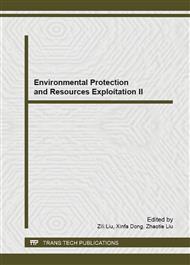p.1918
p.1924
p.1928
p.1932
p.1939
p.1944
p.1949
p.1957
p.1963
A Correlation Game Analysis between Regional Trade and Environmental Cooperation
Abstract:
With the development of economic globalization and Industrial modernization, the problems of Environmental pollution and pollutants transponder have become diverse and serious. Under the premise of the "super national organizations absent, cooperation is considered the key to solve the global environmental predicament effective means. Through the game theory to establish the regional trade and environment related analysis framework, which proved the mechanism not only could ensure international trading profits, at the same time, it can effectively solve the hitchhike behavior in the process of regional environmental cooperation. In order to achieve effective incentives for regional environmental governance action, promote the regional environmental cooperation, then effectively incentive the regional environmental governance activities, and promote the regional environmental cooperation.
Info:
Periodical:
Pages:
1939-1943
Citation:
Online since:
August 2014
Authors:
Keywords:
Price:
Сopyright:
© 2014 Trans Tech Publications Ltd. All Rights Reserved
Share:
Citation:


